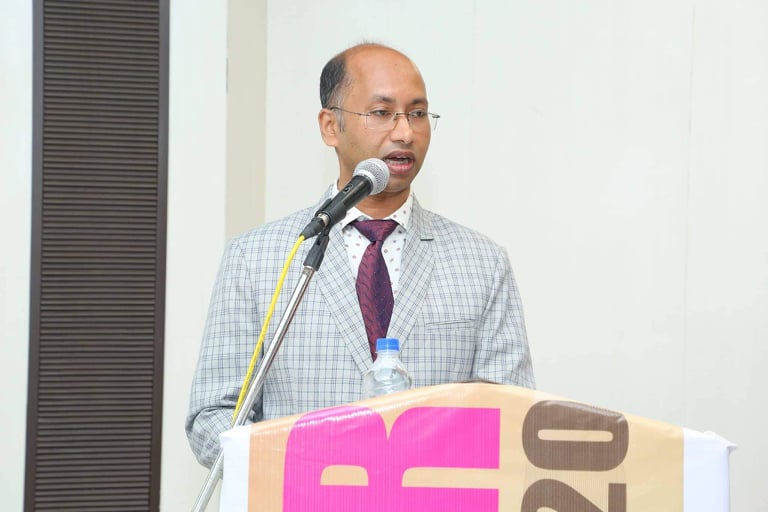Postcolonial Disillusionment: A Historicist Reading of Chinua Achebe’s A Man of the People
DIASPORA LITERATURE: A SPACE OF BEING AND BECOMING
Read the Article | DIASPORA LITERATURE: A SPACE OF BEING AND BECOMING
Gender is not biological. It is a construction and a society imposes it upon its members. Sexism is biological and in many situations it is manipulated by the patriarchal power-structure which maintains a staunch belief that women are innately inferior to men. A community’s orality works in many ways as a repository of such patriarchal prejudice and takes up a repressive role in objectifying women. Many myths in African orality serve as a repository of this repressive force. Modern African literature conspicuously emerges out of the crisis followed by colonialism and imperial enterprises of Europe in Africa. Leaving aside the political issues related to colonial and post-colonial situations, Elechi Amadi explores the heart of Africa and presents an authentic rendition of traditional belief system, power-structure, forces of nature, ethnic values, rituals, songs, myths and festivals in his The Concubine (1966). Africa represents itself more through its orature than through its written form of literary texts. Amadi’s first novel The Concubine (1966) makes a powerful rendition of man’s struggle against the natural forces inherent in orature which antithetically in the name of disciplining, exercises hegemonic role upon man’s free will. Through the character of his female protagonist, Amadi scrutinizes the power of the orature and exhibits how the local myths, belief system and power-structure masculinize a society and set it against the self-determination or free will of women. This paper seeks to delve deeper into the antithetical power of orality both as a constructive and a repressive force in deciding women’s role in the society.
Read the Article | Orality, Gender and Sexuality in Elechi Amadi’s The Concubine
In 1950s Chinua Achebe was growing up as a writer when Nigeria was also recording huge growth as a nation. The successive decades saw him grow more and more mature and reading his country as an entity with its political, social, cultural, linguistic psychological and historical realities. In his second novel, No Longer at Ease, which was published in 1960, the year of Nigeria’s independence and transition from a colonial to a post-colonial era, Achebe has explored the character of Obi Okonkwo, the protagonist, who in the face of hybridization of local culture is troubled with identity-crisis. True, in the colonial situation interactions between the colonizers and the colonized cause hybridization of culture and interpenetration of two different cultures creates an identity-crisis of the locals. Macaulay, in his “Minute on Indian Education” (1835) refers to such ambivalent locals as mimic men who would be interpreters between the rulers and the ruled. He believes that they will be Indian in blood and colour but English in taste, opinions, morals and intellect. This hybridization will create anxiety among the locals and it will guarantee the colonizers’ political, economic and cultural endurance. This crisis of anxiety worsens when the locals, without sharing the common values and aspirations of the local tradition which is crucial to safeguard and protect self-identity, try to mimic the colonizers’ culture and assume it as an ideal for projecting identity. In this paper, my purpose is to show, in a theoretical format, how Obi Okonkwo in Chinua Achebe’s No Longer at Ease turns into Macaulay’s mimic man[i] and how mimicry leads him to his identity-crisis.
Read the article|Obi Okonkwo- A Mimic Man Troubled with Identity-Crisis in Cultural Hybridity in Achebe’s No Longer at Ease
Colonialism’ is usually viewed negatively and the term evokes images of persecution, exploitation, enslavement, distortion if indigenous culture, way of thinking and jingoistic and racist attitude. Viewed from a psychological perspective, colonial texts serve as a psycho-affecting discourse as they shape the minds and disposition of the natives to a great extent and thus very often deliberately intend to draw allegiance of the natives by distorting indigenous culture and history and misinterpreting the natives as primitives, devoid of civilization. This paper aims at making a critical approach to some prominent colonial writers who wrote with first hand experience of life, cultures, rituals, languages and minds of the Subcontinent, and showing how they distorted these phenomena in their texts. The specialty of this paper lies in the juxtaposition of colonial discourse with psychoanalysis.
Read the article|Colonialism − A Psycho-Affecting Discourse
ইউরোপীয়রা আফ্রিকাকে দেখেছে ‘কৃষ্ণ চশমা’ দিয়ে। আর বাঁকি বিশ্বও এঁদের দ্বারা প্রভাবিত হয়ে আফ্রিকার যে রূপ দেখেছে তা-ও কৃষ্ণ বা কালো। প্রায় বিংশ শতাব্দীর মাঝামাঝি পর্যন্তই তো আফ্রিকার সাথে বাকি বিশ্বের শুধুমাত্র কূটনৈতিক সম্পর্কই চলছিল। আফ্রিকার অভ্যন্তরে প্রবেশ করা হয়নি। এর জন্য ঔপনিবেশিক মানসিকতাই অনেকাংশে দায়ী। আফ্রিকী সাহিত্যের লৈখিক রূপ প্রাচীন নয়, নবীণ। কিন্তু এর মৌখিক সাহিত্যের অসাধারণ প্রাচীনত্ব, গভীরতা, জীবন ঘনিষ্ঠতা, দার্শিনিকতা, কাব্যিক ব্যঞ্জনা, রূপ-কল্পতা ও বৈদগ্ধতা বিশ্বের যেকোন প্রান্তের সাহিত্য-পাঠককে মুগ্ধ করে, চমৎকৃত করে।
Read the Article|ঔপনিবেশিক-রাজনীতি-ও-আফ্রিকার-প্রতিক্রিয়া
স্যম্বেন উসমান এর অভিশাপ ভৌগোলিক ও জাতীয় সীমানা পেরিয়ে আফ্রিকী সমাজ, সংস্কৃতি, রাজনীতি ঔপনিবেশিকতার বলয়ে অভিজাত শ্রেণীর উত্থান ও তার সাথে স্থানীয় ভাষা, সংস্কৃতি ও চেতনার দ্বন্দ্বকে যিনি সিনেমার পর্দায় চিত্রায়নের মধ্য দিয়ে বিশ্বের দরবারে উপস্থাপন করেছেন তিনি স্যাম্বেন উসমান (১৯২৩-২০০৭), সেনেগালের কিংবদন্তী সাহিত্যিক ও প্রখ্যাত চলচ্চিত্র পরিচালক। Read the Book Review of Sembene Ousman’s Xala
“রবীন্দ্রনাথই সর্বাংশে শেষ ভারতীয় কবি”। বিংশ শতাব্দীর তিনের দশককে বলা যায় আধুনিক বাংলা কবিতার প্রথম দশক কারণ এই দশকেই আধুনিক বাংলা কবিতার ‘প্রতিষ্ঠাতা পিতৃপুুরুষ’দের কণ্ঠস্বর প্রথম শোনা যায়। দু’টি প্রধানতম ঘটনা ত্রিশের দশকের কবিতার গতি-প্রকৃতিতে আমুল তোলপাড় নিয়ে আসে। এই দুই ঘটনার একটি হলো ১৯৩০ সালে সুধীন্দ্রনাথের ‘কাব্যের মুক্তি’ প্রবন্ধের প্রকাশ, অপরটি হলো ১৯৪১ সালে রবীন্দ্রনাথের মৃত্যু। রবীন্দ্রনাথ পৃথিবীর বহুদেশ ভ্রমণ করেছেন, দেখেছেন ও জেনেছেন অনেক। কিন্তু তাঁর কবিতার পটভূমি বাংলা। রবীন্দ্রনাথ তাঁর কোন কোন কবিতায় যেমন, ‘বসুন্ধরা’ বা ‘অহল্যার প্রতি’তে বিশ্বচেতনা বোধের পরিচয় দিয়েছেন বটে কিন্তু তা বাংলার পটভূমির বাইরে নয়। কিন্তু বিষ্ণু দে, সুধীন্দ্রনাথ, অমীয় চμবর্তী, জীবনানন্দ দাস যেভাবে নিজেদের আন্তর্জাতিকতার কেন্দ্রে স্থাপন করে বিশ্বসংকট ও বিশ্বসংগ্রামের কণ্ঠস্বর হয়ে উঠেছেন তা সত্যিকার অর্থেই তাঁদের আধুনিক বাংলা কবিতার পিতৃপুরুষরূপে প্রতিষ্ঠা করেছে।
Read the article|খোন্দকার আশরাফ হোসেন : এক অনুসন্ধিৎসু কাব্য গবেষক
আফ্রিকার বিশ্বাসব্যবস্থা ও কতিপয় নাইজেরীয় উপন্যাস| Read the article Africar dhormo biswas
Elham Hossain’s Book on History of English Literature Elham History Book
Elham Hossain’s Translation of Dambudzo Marechera Kalo Chamra
Elham Hossain’s Translation of Ngugi’s “Teach Me to be Me” Ngugi_teach me to be me
Elham Hossain’s write up on “Ngugi Language”
Elham Hossain’s Translation of Yusuf Sibai’s Story “The Country Boy” Yusuf Sibai’s Translation
Elham Hossain’s Writing published in Green University Review of Social Science Things Fall Apart: An Attempt of Achebe’s Liberal Imagination
Elham Hossain’s Article Dialogic Reading of African Literature in Bengali: An Interpenetrative Image of Africa in Bengali Translation
Elham Hossain’s Writing on Fanon in Bengali
Elham Hossain’s writing on Sembene Ousman
Elham Hossain’s introductory speech on Ngugi at a seminar
Elham Hossain’s Writing on Greek Greek Literature
Elham Hossain’s Translation of Maya Angelo
Elham Hossain’s writing on Short Stories of America
Elham Hossain’s write up on Turkish Literature
Elham Hossain’s write up on French Literature
Elham Hossain’s Translation of a Short Story Read More
Elham Hossain’s Translation of Nagib Mahfuz’s story Read More
Elham Hossain’s Translation of Interview on Ben Okri Read More
Elham Hossain’s Translation of Lara Vapnyar’s short story Read More
ইউসুফ ইদ্রিসের গল্প : মিশরের রাজনীতির অহমিকার বেলুন ফুটো করে দেয়
Conflicted Space: A Geopolitical Shaping of
Integration and Autonomy in Abdulrazak Gurnah’s Paradise

